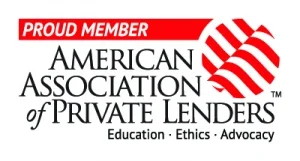In the dynamic world of real estate investing, securing the necessary funds for a down payment can often be a significant hurdle. Hard money loans, known for their quick approval and flexible terms, may seem like an appealing option to bridge this gap. But can you really use a hard money loan for a down payment on another property?
While it’s technically possible in some scenarios, it’s important to understand the intricacies and potential risks involved. This article by Tidal Loans, your Houston-based real estate financing experts, will delve into the feasibility, benefits, and drawbacks of using a hard money loan for a down payment. We’ll also explore alternative strategies and offer guidance on making informed decisions for your investment journey.
Understanding Hard Money Loans
Hard money loans, also known as private money loans or bridge loans, are a unique financing option primarily used in real estate transactions. Unlike traditional loans from banks, hard money loans are typically funded by private individuals or companies. These loans are asset-based, meaning the property itself serves as collateral rather than the borrower’s creditworthiness.
Here are some key characteristics of hard money loans:
- Short-Term: Hard money loans are usually short-term loans, with terms ranging from a few months to a few years. This makes them ideal for investors who need quick access to capital for time-sensitive deals or for projects that require rapid completion.
- Asset-Based: The property being purchased or renovated serves as the primary security for the loan. This means that the lender’s decision is based more on the property’s value and potential than on the borrower’s credit score or income.
- Higher Interest Rates: Hard money loans typically have higher interest rates than conventional loans due to their shorter terms and the perceived higher risk for lenders.
- Flexible Terms: Hard money lenders are often more flexible with their terms than traditional lenders. This can be beneficial for borrowers with unique circumstances or those who need to close a deal quickly.
- Less Stringent Credit Requirements: Hard money lenders may not require the same level of creditworthiness as traditional lenders, making them accessible to borrowers with less-than-perfect credit.
Due to these characteristics, hard money loans are often used by real estate investors for fix-and-flip projects, bridge financing, and other short-term investment strategies.
Down Payment Requirements
Down payments are a crucial aspect of most real estate transactions, serving as a borrower’s initial investment in the property. In traditional mortgage lending, down payments demonstrate the borrower’s commitment to the purchase and reduce the lender’s risk.
Typical down payment requirements vary depending on the loan type:
- Conventional Loans: These loans typically require a down payment of at least 3%, although a higher down payment (20% or more) can help borrowers avoid private mortgage insurance (PMI).
- FHA Loans: Backed by the Federal Housing Administration, FHA loans are known for their lower down payment requirements, often as low as 3.5%.
- VA Loans: Veterans Affairs loans are available to eligible veterans and active-duty military personnel. They often require no down payment at all.
For many borrowers, accumulating a substantial down payment can be a significant challenge. This is where the idea of using a hard money loan for a down payment might seem appealing. However, it’s important to consider the potential risks and complexities involved before pursuing this strategy.
Using Hard Money Loans for Down Payments
The concept of using a hard money loan to finance a down payment on another property is complex and involves several considerations. While not explicitly prohibited in all cases, this strategy is generally discouraged due to the inherent risks involved and potential complications that may arise.
Possible Scenarios:
In certain limited situations, using a hard money loan for a down payment might be considered. For example, a seasoned investor with a proven track record and a strong financial profile might be able to secure a hard money loan on one property and use the proceeds as a down payment on another investment property. However, this is not a common practice and would require careful consideration of the risks involved.
Risks Involved:
Using a hard money loan for a down payment can significantly increase your overall debt burden and financial risk. The higher interest rates and shorter repayment terms associated with hard money loans can lead to increased monthly payments and a greater risk of default if the investment doesn’t perform as expected.
Alternative Strategies:
Before considering using a hard money loan for a down payment, it’s crucial to explore alternative strategies that may be more financially sound and less risky:
- Savings: The most straightforward and prudent approach is to save for a down payment over time. This allows you to build equity in the property from the outset and avoid accumulating additional debt.
- Gifts: In some cases, family members or friends may be willing to gift you funds for a down payment. However, it’s important to document these gifts properly to avoid potential tax implications.
- Grants: Certain government-sponsored programs or non-profit organizations offer grants or down payment assistance programs to eligible homebuyers. Researching these options could help you secure the necessary funds without incurring additional debt.
Considerations and Risks
Using a hard money loan for a down payment, while technically possible in some cases, comes with significant considerations and risks that borrowers should carefully evaluate before proceeding:
Financial Implications:
- Higher Overall Debt: Taking on a hard money loan to finance a down payment essentially means you’re accumulating more debt. This can lead to increased monthly payments and a higher overall financial burden.
- Increased Interest Payments: Hard money loans typically have higher interest rates than conventional loans. This means you’ll be paying more in interest over the life of the loan, which can significantly impact your overall investment returns.
- Risk of Default: If the investment property doesn’t perform as expected or if you encounter unexpected financial challenges, you could face difficulty making payments on both the hard money loan and the mortgage on the second property, increasing the risk of default.
Lender Restrictions:
- Down Payment Source Verification: Many conventional lenders require documentation to verify the source of your down payment funds. Using a hard money loan might raise red flags for some lenders and could lead to additional scrutiny or even loan denial.
- Loan-to-Value (LTV) Ratios: Lenders typically have maximum LTV ratios for conventional loans. Using a hard money loan for a down payment could push the overall LTV ratio beyond the lender’s limits, making it difficult to secure the mortgage.
Ethical Concerns:
- Transparency: Some lenders and real estate professionals may raise ethical concerns about the transparency of using a hard money loan for a down payment. It’s essential to be upfront and honest with all parties involved about the source of your funds to avoid potential legal or reputational issues.
Before deciding to use a hard money loan for a down payment, it’s crucial to carefully weigh the financial implications, lender restrictions, and ethical considerations involved. Consulting with a financial advisor or a mortgage professional can help you make an informed decision based on your individual circumstances and risk tolerance.
Seeking Professional Guidance
Navigating the complexities of hard money loans and down payment strategies can be daunting, especially for those new to real estate investing. Seeking guidance from experienced professionals is crucial to making informed decisions that align with your financial goals and risk tolerance.
Tidal Loans is a Houston-based lender specializing in various real estate financing solutions, including hard money loans and conventional mortgages. Our team of seasoned mortgage professionals possesses in-depth knowledge of the local market and can provide personalized advice tailored to your unique situation.
We understand the intricacies of using hard money loans for down payments and can help you assess the feasibility and potential risks involved. Our commitment to transparency and responsible lending ensures that you receive accurate information and guidance throughout the process.
Whether you’re a seasoned investor or just starting out, Tidal Loans is here to support your real estate journey. We offer a range of resources, including educational materials and one-on-one consultations, to help you make informed decisions about your financing options.
Don’t hesitate to contact Tidal Loans today for a free consultation. Our team is ready to answer your questions, address your concerns, and help you explore the best strategies for achieving your real estate investment goals.


